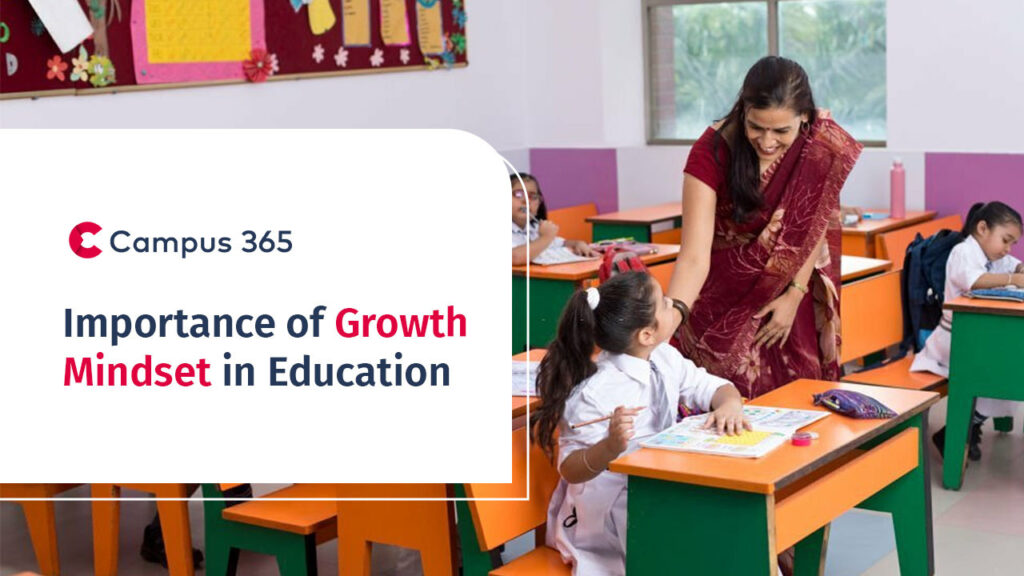Importance of Growth Mindset in Education

Growth mindset in education
In the dynamic landscape of education and personal development, the concept of a growth mindset has emerged as a pivotal factor in shaping the success of children. A growth mindset, grounded in the belief that abilities and intelligence can be cultivated through dedication and hard work, stands as a cornerstone for resilience, adaptability, and lifelong achievement. This article delves into the significance of a growth mindset in a child’s journey to accomplishment and success, highlighting the important roles that parents and teachers play in fostering this mindset. Additionally, it addresses the challenges associated with implementing and sustaining a growth mindset initiative.
Understanding the Growth Mindset
Growth mindset in education is a powerful catalyst for fostering resilience, perseverance, and adaptability in children. At its core, it is the understanding that abilities are not fixed but can be honed through dedicated effort and continuous learning. This mindset motivates children to embrace challenges, view setbacks as opportunities for growth, and develop a genuine love for learning. By instilling a growth mindset, we empower children to take ownership of their education and personal development, laying the groundwork for a lifetime of success.
Parental Influence
Parents wield unparalleled influence in shaping a child’s mindset. By praising effort and perseverance over innate talent, parents can actively contribute to instilling a growth mindset. Creating an environment at home that celebrates mistakes as valuable learning opportunities is instrumental in nurturing a mindset that values hard work and resilience. Moreover, parents who model a growth mindset through their own behaviors and attitudes significantly contribute to shaping their children’s beliefs about learning and success. Parents serve as the primary architects of a child’s early worldview, and their words and actions leave a lasting imprint. Emphasizing the process of learning rather than fixating on outcomes cultivates a mindset that cherishes the journey of improvement.
Educators as Facilitators
Teachers play a distinctive and influential role in shaping the mindset of their students. Beyond the transmission of knowledge, educators can actively contribute to creating classroom cultures that foster a growth mindset. Offering constructive feedback that centers on effort, improvement, and the process of learning rather than fixed abilities can significantly impact students’ attitudes toward education. In addition, incorporating challenging yet achievable tasks into the curriculum encourages students to stretch their intellectual and creative capacities. A growth-oriented classroom environment is characterized by a focus on the learning process rather than mere performance outcomes. Teachers can inspire a passion for learning by nurturing an atmosphere where curiosity is encouraged, mistakes are viewed as stepping stones to mastery, and challenges are embraced as opportunities for growth.
The Role of Technology
In the contemporary educational landscape, technology plays an increasingly pivotal role in shaping the mindset of young learners. School Management Software, Interactive educational tools, online platforms, and digital resources can be harnessed to create an environment that fosters a growth mindset. Gamified learning experiences, for instance, provide students with challenges that require problem-solving and critical thinking, promoting a mindset that embraces effort and persistence.
Challenges in Implementation
While the benefits of instilling a growth mindset are evident, the implementation of such an initiative faces its share of challenges. One formidable obstacle is the deeply ingrained societal emphasis on innate talent and intelligence. Shifting this mindset requires concerted efforts from parents, educators, and the broader community to redefine success as a product of hard work, dedication, and a commitment to learning.
Moreover, the pervasive fear of failure that is often instilled in academic settings can impede the development of a growth mindset. Overcoming this fear required the establishment of an educational environment that normalizes setbacks, reframing them as invaluable learning opportunities. This cultural shift within educational institutions is essential for creating a fertile ground for the growth mindset to take root and flourish.
Conclusion
In conclusion, the cultivation of a growth mindset in education is paramount for children’s enduring success and fulfillment. It is a shared responsibility among parents, educators, and policymakers to create an environment that fosters a love for learning, resilience in the face of challenges, and a belief in the power of effort and dedication. By doing so, we collectively pave the way for a generation of individuals equipped to navigate the complexities of an ever-changing world with confidence, competence, and a profound understanding of the limitless potential that resides within a growth-oriented mindset.

